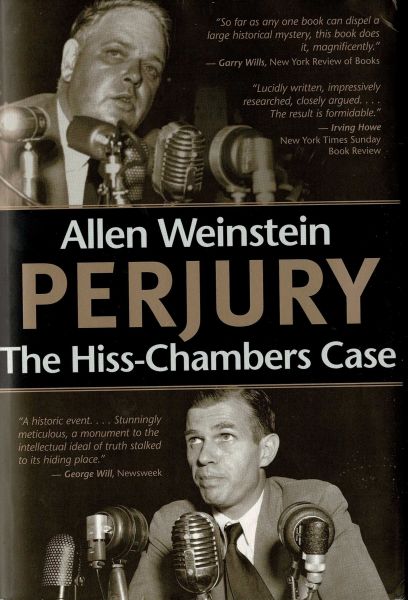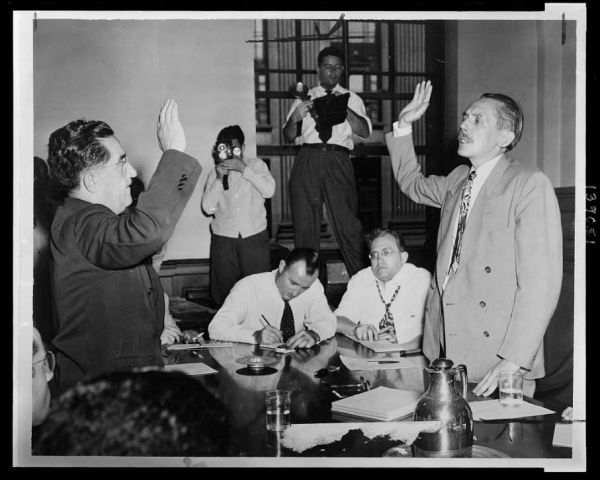Perjury: the Hiss-Chambers Case and the Truth about the Alger Hiss Case
Tipped off by its principal witness Whittaker Chambers, the Congressional House Sub-committee for Un-American Activities, known as HUAC, opened an investigation of Alger Hiss and conducted it as a public hearing, lending it a sensationalism that people hate, nowadays. Chambers had alleged that a half-dozen important government officials had been secret members of the Communist Party in the 1930s. Led by the ambitious freshman congressman and future President Richard Nixon, HUAC conducted a hostile, if not prosecutorial, interrogation of Hiss, who had to deal with the turning of screws on a daily basis, like a defendant on the witness-stand:
page 44: (Congressman Karl Mundt confronts Hiss with an interim assessment of the hearings.)
"You knew this man [Chambers]; you knew him very well. You knew him so well that you even
trusted him with your apartment; you let him use your furniture; you let him use or gave him
your automoble, You think that you probably took him to NewYork. You bought him lunches in
the Senate Restaurant. You had him staying in your home . . . and made him a series of small
loans. There seems no question about that."
Although not sure what it had, the HUAC examined the public records on Alger Hiss's Ford car, trying to establish a bridge between him and Chambers:
page 47: In a memorandum filed that day, McLean wrote: "Emmanuel Bloch, attorney for
William Rosen, told me the following [facts] today. Rosen does not know Hiss. Rosen did lend
himself to a dummy transaction concerning the Ford car. Apparently Rosen did not sign the title
certificate dated July 23, 1936. It is not clear whether Rosen knew at that time that his name
would be used in this transaction. However, at some later date, a man came to see Rosen and
told him that the title certificate to the Ford was in Rosen's name and asked Rosen to sign an
assignment of (the car) to some other person. Rosen did this. The man who came to see Rosen
is a very high Communist. His name would be a sensation in this case. The man who ultimately
got the car is also a Communist. Bloch intimated that Rosen is a Communist but did not say so
expressly." (Bloch defended Julius and Ethel Rosenberg in their treason trial.)
McLean's memo tends to verify Chambers's account of how the 1929 Ford . . . left Alger Hiss's
ownership to be transferred by a "very high Communist" [J. Peters?] to another Party member.
Even though William Rosen had participated in auto-fraud, he had even greater legal problems. Most serious was the fact that he had allowed the Soviet Secret Service to co-opt him—a rank-and-file Party member—to assist in the Soviets' illegal operations, and it wrecked his life. Rosen also jeopardized the legal status of the American Communist Party, itself! Investigators knew that the Communist Party was cooperating with the Soviet secret service and wanted to outlaw it.
Weinstein writes that this happened in other instances, most notably in the case of the literary agent Maxim Lieber. Whittaker Chambers asked Lieber to help him with a hackneyed scheme to enable espionage against Japan. Lieber explained to Weinstein:
page 113: "We were all Communists," Lieber noted, and I regarded him as a friend." The literary
agent and the CP courier shared common interests in literature, music, and chess. . . .
"There were cells in Washington, no question. The ninth floor, for example [where J. Peters had
his office] knew of my relations with Chambers."
The feminist author Josephine Herbst knew Whittaker Chambers through her husband John Herrmann who worked under Chambers in the Soviet underground:
page 122: "Alger Hisss did meet 'Carl' (Chambers)," Herbst told (Harold) Rosenwald. "'Carl' told
me of such a meeting and said Alger Hiss was 'a very cagey individual' but very charming, and
that Mrs. Hiss, whom 'Carl' also met, was very charming."
. . . In her interview with McLean, Herbst gave a clear description of the "parallel apparatuses"
that Peters had directed Chambers to organize in Washington.
Finally, Weinstein uncovered in the archives of the State Department this crucial information about the Department's own investigation of Alger Hiss:
page 323: Recently classified State Department memos show that by the spring of 1946, almost
all of the Department's security staff thought Hiss had been involved in some form of undercover
Communist work. Not only was his future at State placed in a departmental holding pattern—
with consideration for promotion or for confidential assignments ruled out by orders from
Secretary Byrnes's office—but Hiss's daily work and associates came under the closest scrutiny.
As far as I know, no one has positively identified the illusive "J. Peters". Chambers thought that his real name was Alexander Goldberger, or "Sandor" in Hungarian, who worked as a secret agent for the Soviet Union. In 1953 or '54, the INS took Peters into custody from his home in Brooklyn, New York, where he lived under the alias "Isidore Boorstein," then deported him.
Long after the INS deported Peters back to Hungary, Allen Weinstein travelled there to interview him for Perjury, by which time he had changed his name officially to "Jozsef Peter". Peters remained a Cold Warrior to the end. Before he entered Weinstein's hotel room, he sent a team of "plumbers" ahead of him, presumably to check for hidden microphones. Peters admitted almost nothing in his interview with Weinstein, except to say off-hand that Hiss was foolish to sue Chambers for libel, which, most informed people would agree, caused his downfall.


